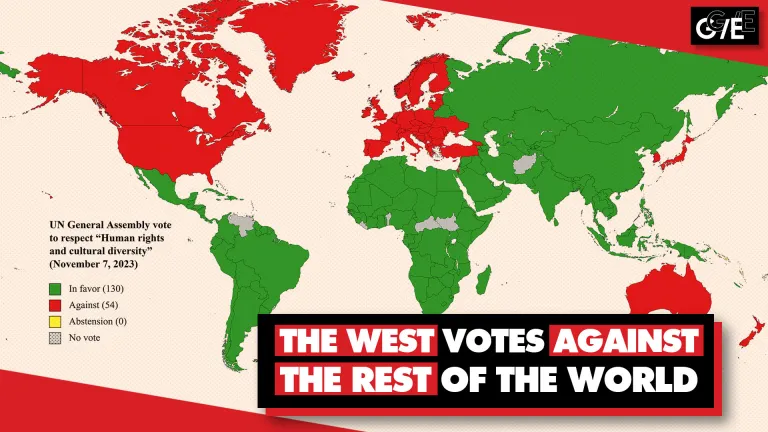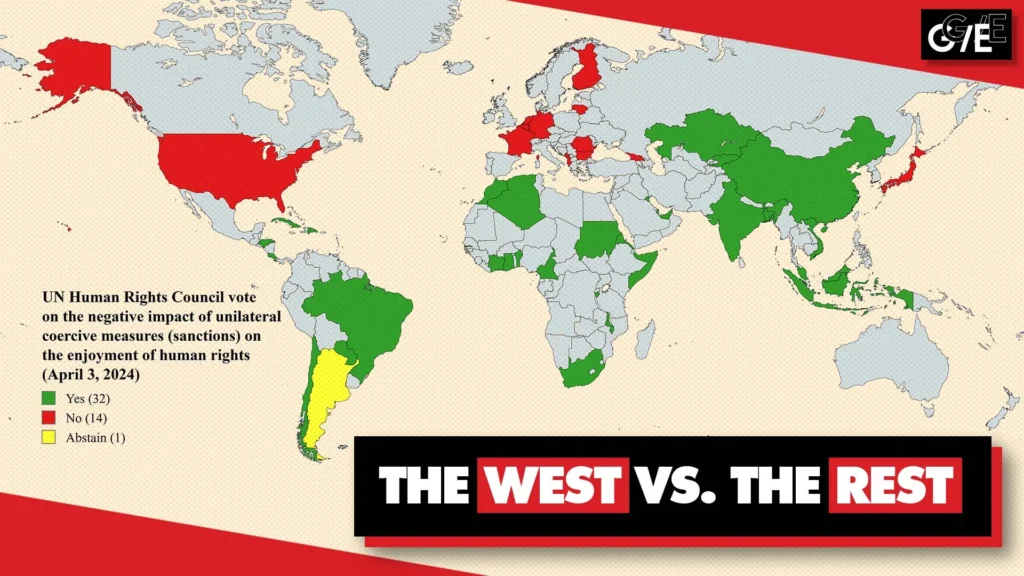West Votes Against Rest of World, Supporting Illegal Sanctions in UN Human Rights Council
UNITED NATIONS, 15 Apr 2024
Ben Norton | Geopolitical Economy Report – TRANSCEND Media Service
In the United Nations Human Rights Council, the West voted against the rest of the world, supporting illegal sanctions (known as unilateral coercive measures).
6 Apr 2024 – In the United Nations Human Rights Council, the West voted against the rest of the world, supporting unilateral coercive measures, known popularly as sanctions, which violate international law.
In the April 3 meeting of the Human Rights Council (HRC), a resolution was approved titled “The negative impact of unilateral coercive measures on the enjoyment of human rights”.
The measure condemned sanctions for their “far-reaching implications for the human rights of the general population of targeted States, disproportionately affecting the poor and persons in the most vulnerable situations”.
It called for the UN to take “concrete measures to ensure the removal of unilateral coercive measures affecting the enjoyment of human rights of victims”.
The HRC has 47 members. Of these, 32 voted in favor, 14 voted against, and 1 abstained.
The countries that opposed the resolution consisted of the United States, its European allies, and Japan. The only nation that abstained was Argentina, which is governed by far-right leader Javier Milei, who has pledged staunch support for the US.
China voted in alliance with the global majority.

This measure condemning unilateral coercive measures had been sponsored by the Non-Aligned Movement (NAM). Uganda, which is currently chairing the NAM, denounced the imposition of sanctions by wealthy Global North countries.
The United States has levied sanctions against more than 50 countries, representing over one-quarter of the world population and approximately one-third of global GDP.

In the same session on April 3, the HRC approved another resolution titled “Effects of foreign debt and other related international financial obligations of States on the full enjoyment of all human rights, particularly economic, social and cultural rights”.
This measure called for “debt relief” and proposed “urgent measures to alleviate the debt problem and to address the debt sustainability of developing countries”.
Once again, the West voted against the resolution, while most of the Global South supported it.
The final vote was 31 in favor and 12 against, with four abstentions.
China, again, voted in alliance with the global majority.

The West frequently votes together in a bloc against the Global South in the United Nations.
Geopolitical Economy Report documented in November 2023 how, in the UN General Assembly, the West voted against the rest of the world, opposing resolutions on democracy, human rights, and cultural diversity and supporting sanctions and mercenaries.
 _____________________________________
_____________________________________
 Benjamin Norton is an investigative journalist, analyst, writer and filmmaker. He is the founder and editor of Multipolarista and is based in Latin America. His website: BenNorton.com (Publicaciones en español aquí.)
Benjamin Norton is an investigative journalist, analyst, writer and filmmaker. He is the founder and editor of Multipolarista and is based in Latin America. His website: BenNorton.com (Publicaciones en español aquí.)
Go to Original – geopoliticaleconomy.com
Tags: UNHRC, United Nations, West
DISCLAIMER: The statements, views and opinions expressed in pieces republished here are solely those of the authors and do not necessarily represent those of TMS. In accordance with title 17 U.S.C. section 107, this material is distributed without profit to those who have expressed a prior interest in receiving the included information for research and educational purposes. TMS has no affiliation whatsoever with the originator of this article nor is TMS endorsed or sponsored by the originator. “GO TO ORIGINAL” links are provided as a convenience to our readers and allow for verification of authenticity. However, as originating pages are often updated by their originating host sites, the versions posted may not match the versions our readers view when clicking the “GO TO ORIGINAL” links. This site contains copyrighted material the use of which has not always been specifically authorized by the copyright owner. We are making such material available in our efforts to advance understanding of environmental, political, human rights, economic, democracy, scientific, and social justice issues, etc. We believe this constitutes a ‘fair use’ of any such copyrighted material as provided for in section 107 of the US Copyright Law. In accordance with Title 17 U.S.C. Section 107, the material on this site is distributed without profit to those who have expressed a prior interest in receiving the included information for research and educational purposes. For more information go to: http://www.law.cornell.edu/uscode/17/107.shtml. If you wish to use copyrighted material from this site for purposes of your own that go beyond ‘fair use’, you must obtain permission from the copyright owner.
